“I wasn’t somebody who was obviously going to become a scientist”
Interview with David MacMillan, February 2022
Nobelprize.org interviewed chemistry laureate David MacMillan in February 2022. He told us about his childhood in Scotland, how his brother’s choice to go to university inadvertently led to his career in science and his research group’s love of pranks.
Can you tell us a little bit about your childhood. Were you always interested in science?
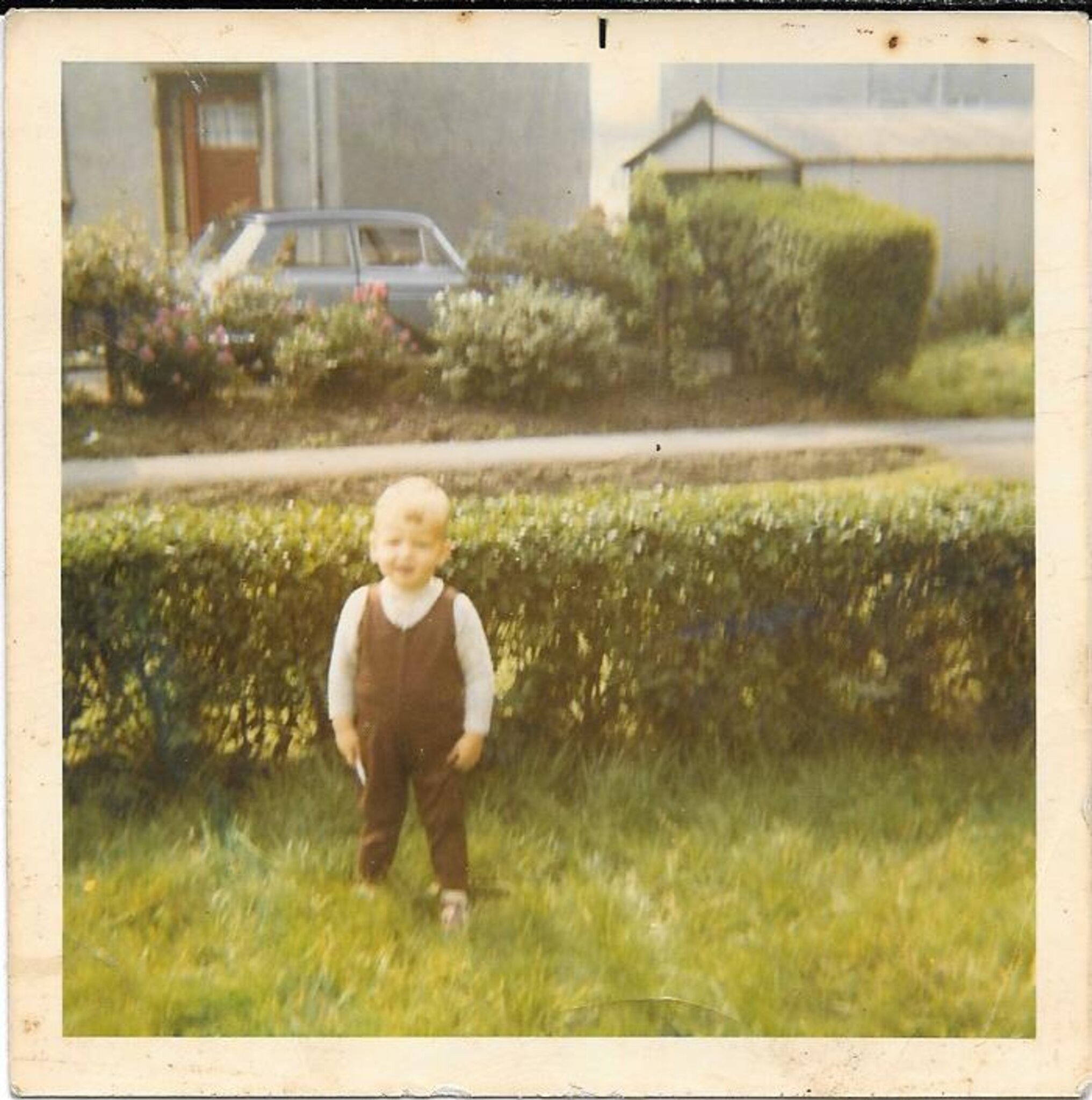
David MacMillan as a toddler in his childhood neighbourhood in Scotland.
Courtesy of David MacMillan
David MacMillan: I was born in Bellshill and grew up in a small village called New Stevenston, which was located between two steel works and a coal mine. My grandfather was a miner. My father was a steelworker. I had a really fantastic childhood, I went to the local state school. It was an incredibly happy experience, it was just such a fun place to be. Great humour, fantastic teachers. We had great community – everyone would run in and out of each other’s houses all the time. My next door neighbours, I would never knock on the door, I would just always walk in. Similarly when I went to high school it was equally fun.
I wasn’t [always interested in science] to be honest, I always feel guilty answering that question. In fact I wanted a chemistry set when I was about eight or nine years old and I immediately destroyed it because I didn’t follow the instructions particularly well, whereas my older brother made all the soap and all the things you were supposed to do with it. So I would say I wasn’t exactly someone who was a classic phenotype who’s going to end up being a scientist. I was always a curious kid. I was always interested in new things. But I wouldn’t say I was someone who was obviously going to become a scientist.
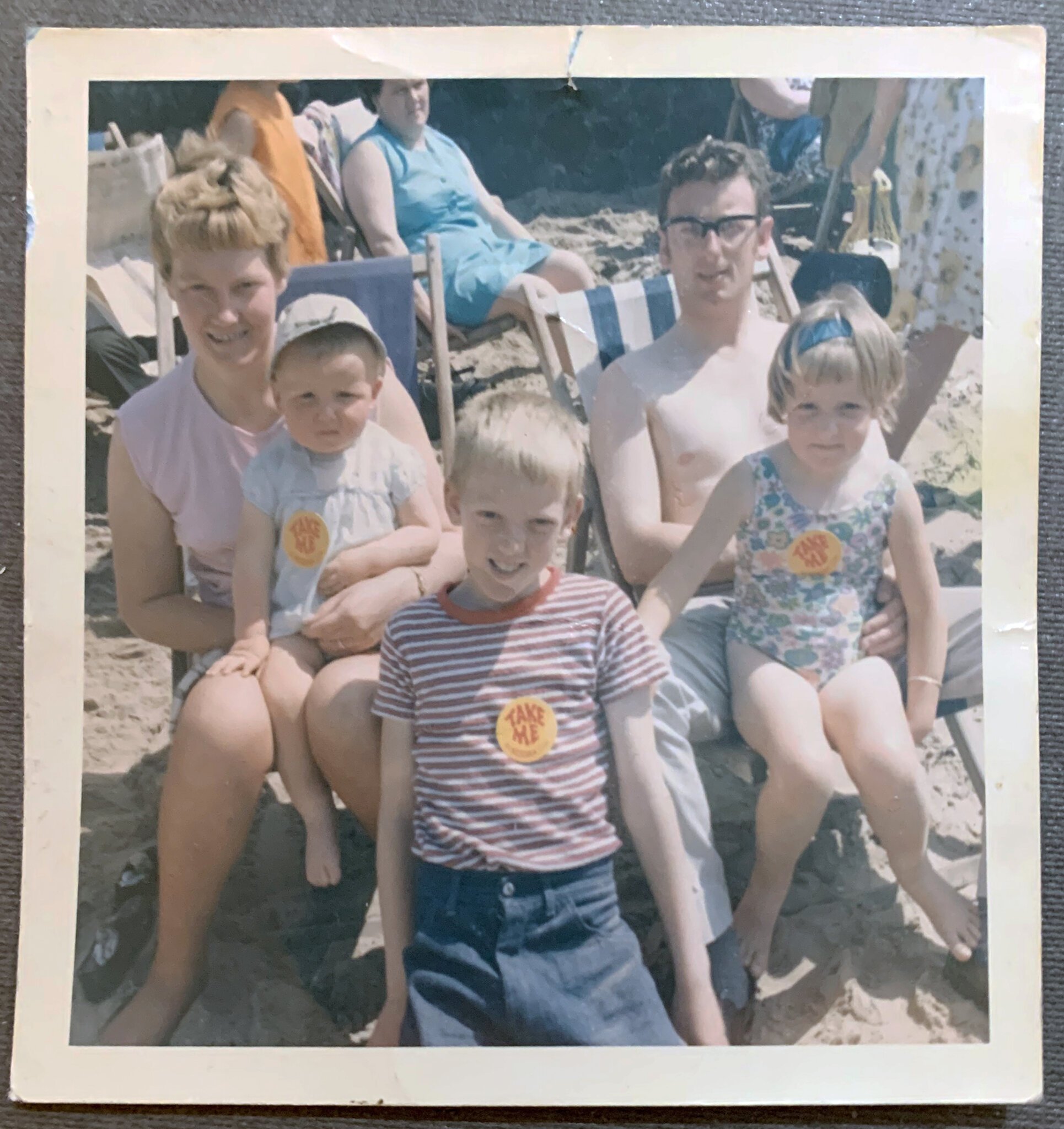
David MacMillan as a baby at the beach in Blackpool with his family. L-R: David’s mother May; David (seated on her lap); brother Iain, foreground; father Will; sister Lorraine (seated on her father’s lap).
Courtesy of David MacMillan
How did you end up going to university?
I’ve told this story a few times, but my brother was the first person I ever knew who went to uni and the only person anywhere in our community who went to uni and he got a bit of a hard time about it. People thought he was just being lazy – and that’s certainly what my mum and dad thought at the time! But he went off to uni, did physics and then at the end, came out and got a job. And the job actually had a salary that was higher than my father’s salary on day one. At that moment, my mum and dad, they decided that I had to go to uni too. But not only that, I had to be a physicist because that’s what my brother had done. So I think there was always encouragement to go off and do what you wanted to do. It was never that you had to go to uni per se.
So you went to university to do physics, how did your passion for chemistry come about?
Basically I was this working class kid. I went off to uni and it was just really overwhelming for me. I remember getting there and the physics lecture was the first thing in the morning in this lecture theatre that was absolutely freezing and there was no heating. So in the dead of winter in Scotland you’d be in this freezing lecture theatre, and when it would rain – which in Scotland it rains – the roof would leak and you’d actually get water falling on you which, for me, was just a really tough time. I went to uni to emulate my brother and it was just clearly not working.
But what for me was kind of interesting, was an hour later you would cross the road and I was taking chemistry as my secondary subject. It was this beautiful, warm lecture theatre. It was this great place to be. And I started to realise I loved this thing called organic chemistry. And the more and more I read about it, the more and more I really enjoyed it and appreciated it. And I think for the first time in my life, I really began to understand what, when scientists fall in love with an area, that was what it was like for me. It was almost like second nature. I’ve told people it felt like breathing at times. It was really straightforward which sounds kind of braggy, but I don’t mean it that way. I mean, just that there was no resistance to learning it whatsoever. For me, almost immediately I knew that was where I was going to go. It was going to be in organic chemistry. It was a subject I’d not really thought about or spent time looking at before. But as soon as we started learning about it was pretty clear that this was where I was going to go.
Your family sound very supportive – can you tell us a little more about your relationship with them?
I always tend to get a bit emotional when I get to these parts of these interviews. Starting off with my family in Scotland… I think I’ve said this before, we’re certainly working class, we didn’t grow up with really anything, but we had an incredible support system of parents and people around us who just thought you could do anything. So that was just remarkable in and of itself. My brother and sister, have always been exactly the same way, incredibly warm, incredibly generous, would do anything for you. And I think now in my family, we have exactly the same spirit.
We really care about each other. We know that family comes first. You’ve got to be able to enjoy yourself. You have to laugh. You have to have fun. If you don’t have that first, then you really don’t have anything. So I think one of the things which is maintained through all of my family is this closeness, generosity, but also support. But making sure you really have a good time together. I think that’s been pretty essential.
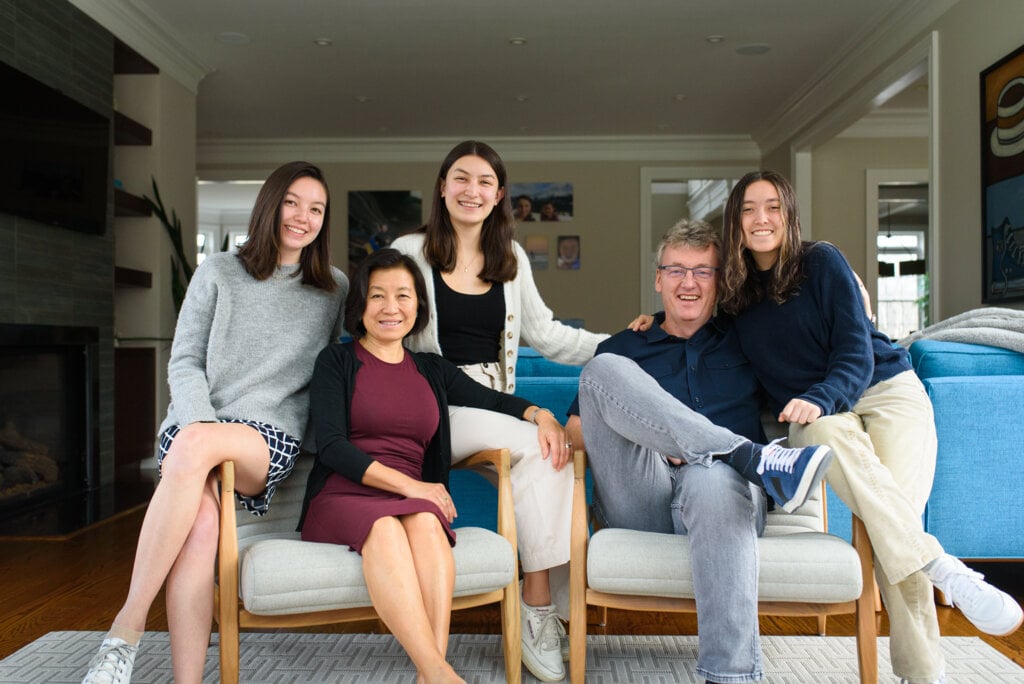
David MacMillan with his wife Jean and their three daughters.
Corinne Strauss Photography
Apart from your family was there anybody else that particularly influenced you when you were younger?
I had a teacher who was in primary school called Miss McKean. All my teachers in primary school were fantastic, but she was someone who just really worked hard, pushed hard. She would always go that extra mile to try and help you out. I always remember for example she knew I loved reading fiction and other books and she’d come in and give me books to read and say, “I know you like this book. Why don’t you read that book?”, and so on and so forth. She was a great example of someone who went the extra mile, but she would always push you as well: What do you know about this? What do you know about that?
I think as an individual who really helps spark your imagination, in thinking about different directions you can see the world, for a young kid in Scotland, she was helping open the world for you. And she was doing it through talking about the world, but also getting you to read about the world. To me, I think she was incredibly important, but also really inspirational in the way that she went about actually being a teacher.
Do you enjoy teaching yourself?
I love to teach and I also love not to teach. I think, when I’m actually in the action of teaching and getting up front of people, I love to do that. It’s an incredibly fun thing. I think if you talk to almost any academic, they’ll tell you that the hard part is the preparation where you have to put in all the hours. That’s not my favourite part. I don’t think it’s anyone’s favourite part.
I think we all truly love getting up in front of a class. Just yesterday I was in the middle of teaching something and I could tell it wasn’t working. It wasn’t going anywhere. And I had to stop and go to the board, and start to try and engage them in a completely different way. All of a sudden you can see that they were getting it. It’s the best thing in world, you know, when you suddenly see that people get something for the first time and it suddenly clicks, I think for any teacher, that’s your favourite part. It gives you goosebumps a little bit. Whenever you can see people for the first time get that piece of knowledge that you know is going to be useful to them down the line.
What’s the best thing about your work and being a scientist?
One of the greatest things about running a big research group is, for the last 20 years I’ve been interacting with people between the age of basically 19 and 27 and I’ve gotten older and they’ve stayed the same age. So they keep that sort of freshness and that enthusiasm that you get to work with every day. You feel incredibly privileged in that way.
In terms of the science, my absolute favourite thing in the world is whenever we discover or invent a new reaction. That happens a lot more than you would think. Still to this day it catches me unawares. Last week, actually we invented a new reaction and I was just sitting in this meeting with 35 people thinking, wow, we didn’t know that this existed yesterday and today this will exist forevermore. That’s a truly remarkable, wonderful feeling. Just to be part of it and see it in real time and know that other people are going use it really soon and use it for making medicines and maybe making materials. That’s a remarkably privileged situation to be in to be at that forefront of that scientific endeavour where you can see these innovations happen in real time. So without question, seeing new reactions being developed and seeing it in real time, that’s my favourite part of being a scientist.
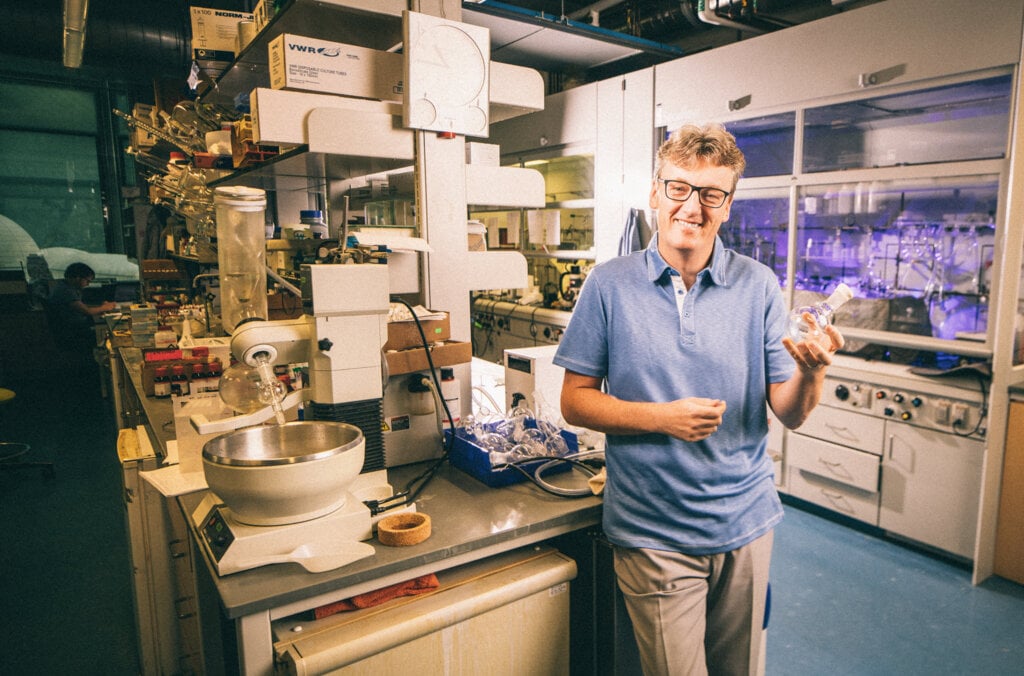
David MacMillan in the lab, 2016.
Photo by Princeton University, Office of Undergraduate Admission, Blue Cadet
Do you have one piece of advice that you would give to a young scientist?
Am I allowed to give two pieces of advice? I’d say as a young scientist don’t hesitate to take chances, I mean in life, in general. When opportunities come along, one thing I’ve found is – it’s really difficult sometimes – but if you just decide that when an opportunity shows up just to go for it, even if you have incredible self-doubt just do it. In my experience, it always ends up being a hundred times easier than you think it’s going to be. I think we tend to hold ourselves back because we’re worried about what other people think, we worry if we’re good enough, imposter syndrome is just everywhere. I think the one thing that I’ve found has been really important in my life is to try and somehow put that on hold and go for things. For my life, it’s really been beneficial. Sometimes things don’t work out, but as a whole, it’s been great.
The second thing I’d say as a scientist, I would say that it’s never about the answers. It’s always about the questions. That’s sort of a bit vague. But what I mean by that is as a scientist, you can choose to work on thousands of different things. And from my mind, the most important thing you can do as a scientist is not to set off and work on something that at the end of the day, might be a curiosity to you, or might be somewhat interesting to other people. For me, it’s always better to think I’m going to spend my time and my energy working on things I believe are going to have an impact. You can do fundamental science and still have an impact on society. If you can merge those two ideas together that allows you to come up with questions of things that you could work on. A lot of times it’s not easy to have answers to those questions, but at least if you set out on trying to address the question at some point solutions will start to show up. You’ve got to have the questions and the good questions before you can ultimately get to those solutions.
And what’s the best piece of advice you’ve ever been given? Was it the same?
That was probably one of them – make sure that you’re working on important problems. I think another piece of advice I got from a really great friend whose name is Dennis Dougherty – he’s a professor at Caltech. He said to me, there’s a hundred thousand ways to get tenure. And what he means by that is there’s no one size fits all formula to do it. You have to go your own way and invent your own path.
I know that sounds cliche, but if you try and do things the way that other people do it, you’ll just end up being a bad version of that person. What you should do is try and figure out what it is that gets you excited and don’t worry so much about how other people are doing things. Just go off and follow your own path and trust your own instincts. I think that piece of advice for me was just remarkable at the time, because it gives you some freedom, to not worry about watching all these geniuses around you do their thing because you can never do what they do. That’s who they are. You just have to do your thing. As long as you stick to that I think not only will it work you’ll have a great thing. It’s much more enjoyable to do it that way.
One of the joys of your announcement was seeing you celebrate with your research team. How did it feel to be able to share it with them?
That was an amazing moment. It was one of the other parts where I felt like the whole world was going to go nuts that day for me. I could sense that. So I decided, wouldn’t it be great if we still had group meeting anyway, because we always have group meeting in the morning. So I wrote this email saying, despite recent events, I think we should still have group meeting this morning, which was I thought pretty funny. So when I came into work, my whole group was there. They actually applauded me, which is the first time in ever they’ve been nice to me! Again it was a whole new world, but then we went into the group meeting and the group meeting was fun. We were presenting the science, but what was really interesting was we had all these photographers and journalists there too who were rolling around group meeting taking pictures of people while we’re presenting the science. So my group were all having a blast with the whole thing.
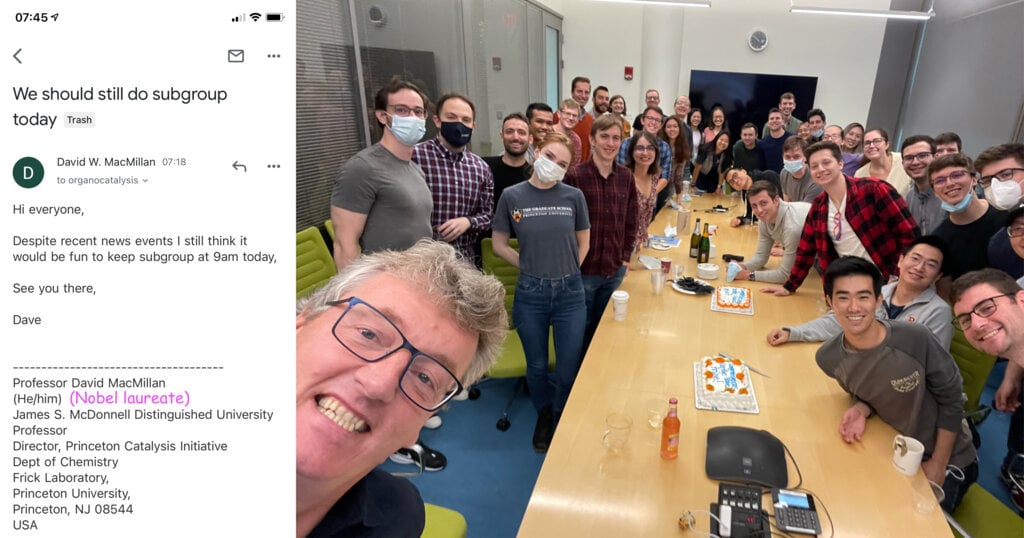
Left: David MacMillan’s email to his group after he found out he had been awarded the Nobel Prize. Right: MacMillan (left) and his research group on the morning of the prize announcement.
Courtesy MacMillan Lab
We understand that when you first found out about the prize you thought it was a prank. Can you tell us about that?
It’s a kind of sad story – a classic imposter syndrome story! I was lying in bed – I’m usually an early riser but this day, for some reason I slept in and my wife got up and she could hear my phone buzzing. It was about five thirty in the morning and she was kind of annoyed. It kept buzzing and she got up, and she goes, “It says here, Ben List is trying to contact you.” And then there’s a number that says someone who’s from Sweden.
So I get out of bed and I’m reading this and it says, “Dave”, and it’s from Ben and it says, “Call me.” So I call him and he didn’t say you’ve won it but he basically said, it’s happening Dave. And I was like, no, I really don’t believe this. I have some ex students who are in Sweden and my group are a very mischievous group. They’re the kind of group that would always be up for pranks. And they’ve either cajoled Ben List into doing this, or he’s part of the prank. He texted me afterwards. I said, “Look, it’s not, I bet you a thousand dollars it’s not.” And then I literally switched my phone off and went back to sleep.
Then after about maybe half an hour, I got up and went downstairs to see who had won the Nobel Prize. I looked on the New York Times to see if they had it and there was this artist rendition of Ben List, and someone who looked something like me and my name at the bottom. It was honestly the most surreal moment of my entire life. I almost honestly fell out the chair staring at this thing.
So you bet Ben List a thousand dollars you hadn’t been awarded the prize! Have you paid him his money yet?
You know – I come across as being classically Scottish – I haven’t paid him yet. I need to pay him. I think we’re going to be together in San Diego in about a month and a half. I’m trying to figure out if I’m going to pay him in pennies or one of those big cheques. But I’m definitely going to pay him. It’ll be the happiest I’ve even been to pay someone a thousand dollars. But I’ll absolutely make sure to make Ben square on the whole bet – I think that’s the least I can do.
What will you do with the rest of the money?
With my Nobel Prize money what we’re doing is we’re taking 100% of it and giving it to a new charitable trust I’ve started. It’s going to give money every year to underprivileged communities or classes for educational purposes, whether it’s for infrastructure, iPads, or to take trips to go to places they couldn’t go before. One of the great things is with all these invitations I’m getting, I’m taking all the honorariums from that as well and putting that all in the trust to build it up. So it has been a dream come true to pay it forward a little bit.
It’s one of those things where you realise that at some point there’s a little bit of your effort involved, but there is an incredible amount of fortune along the way. Once you know that, you realise there’s a lot of people who are not so fortunate, and you have to do things help everyone out. That is certainly the way I was brought up and certainly what I believe in going forward.
This interview has been edited for length and clarity.
First published: March 2022
Nobel Prizes and laureates
Six prizes were awarded for achievements that have conferred the greatest benefit to humankind. The 14 laureates' work and discoveries range from quantum tunnelling to promoting democratic rights.
See them all presented here.
